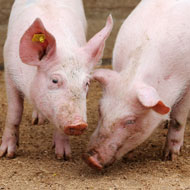Third ASF outbreak confirmed in China

The outbreaks in China are causing alarm, partly because they are so far apart geographically.
Veterinary officials in China have confirmed a third outbreak of African swine fever (ASF) this month.
The latest incident - which occurred in Baofu Village, Jiangsu - involved 615 pigs, 88 of which died and the remainder of which were killed and disposed of. The source of the outbreak is not yet known.
On 3 August, China reported its first case of ASF to the World Organisation for Animal Health (OIE). Over 8,700 pigs in Liaoning were culled and 47 died. Investigations found the pigs came from two privately owned farms belonging to one owner.
A second outbreak was confirmed in the Economic Development Zone in Zhengzhou on 16 August. The infected pigs had been legally transported from a live swine market in Jiamusi city.
The UK’s National Pig Association said the outbreaks in China are causing alarm, partly because they are so far apart geographically. By road, site of the latest outbreak is 800 miles south of Shenyang, Liaoning, where China’s first case was detected.
APHA says the risk of ASF entering the UK is considered to be ‘low’. It is reminding pig keepers not to feed catering waste of any description, in keeping with the law, and to practice good biosecurity.



 The Federation of Independent Veterinary Practices (FIVP) has announced a third season of its podcast, Practice Matters.
The Federation of Independent Veterinary Practices (FIVP) has announced a third season of its podcast, Practice Matters.